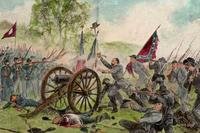Former President Donald Trump rankled many U.S. service members and veterans at a recent campaign event where he compared the Presidential Medal of Freedom to the Medal of Honor.
“When we gave her the Presidential Medal of Freedom… It’s the equivalent of the Congressional Medal of Honor – it’s actually much better because everyone who gets the Congressional Medal, they’re soldiers. They’re either in very bad shape because they’ve been hit so many times by bullets or they’re dead,” Trump said during an August 15, 2024 event in Bedminster, New Jersey, referring to Israeli-American physician and Trump “megadonor” Miriam Adelson, to whom he awarded the Presidential Medal of Freedom in 2018.
“She gets it and she’s a healthy beautiful woman and they’re rated equal, but she got the Presidential Medal of Freedom, and she got it for – and that’s through committees and everything else.”
The former president’s comparison between the two medals drew ire from some veterans on social media, who believed the comment was dismissive of Medal of Honor recipients. Others, like Medal of Honor recipient Florent Groberg, were more nuanced in their responses
“I have a tremendous amount of respect for the Medal of Freedom and what it symbolizes,” Groberg wrote on X. “I believe it's important to recognize the contributions of civilians, and I appreciate the efforts of both past and current presidents in this regard. However, I feel that it's not quite comparable to the Medal of Honor, as they are two very different awards with different criteria and significance.”
Some veterans made the argument that the Presidential Medal of Freedom is more akin to the Congressional Gold Medal. Still others said that because the Congressional Gold Medal and Medal of Honor can require an act of Congress, they are the two that should be held in higher esteem.
So what’s the difference between all these medals?
Medal of Honor

Often erroneously referred to as the “Congressional Medal of Honor,” as Trump called it, the Medal of Honor only requires an act of Congress if the time limit for submitting or presenting the medal has passed. It is presented by the President of the United States in the name of Congress “only upon members of the United States Armed Forces who distinguish themselves through conspicuous gallantry and intrepidity at the risk of life above and beyond the call of duty:
• While engaged in action against an enemy of the United States;
• While engaged in military operations involving conflict with an opposing foreign force; or
• While serving with friendly foreign forces engaged in an armed conflict against an opposing armed force in which the United States is not a belligerent party.”
A Medal of Honor nomination is hard to get and, historically, to survive getting – but it’s not impossible and certainly not a prerequisite. According to the Congressional Medal of Honor Society (again, it’s the society that is Congressional, not the medal), “All recommendations require thorough reports on the act itself, the battlefield and its setting. Every aspect of the action that led to the nomination is documented, from eyewitness statements, to the actions itself, to weather reports… every piece must be examined and verified.”
“Once the documentation is pulled together into a packet, the packet must go through the chain of command. At each step, it is evaluated… The packet can be approved for the Medal of Honor, a lesser award, or for no medal at all.”
Trump was right in saying that some Medal of Honor recipients end up being hit so many times by bullets; Roy Benavidez was shot, stabbed or otherwise wounded 37 times in Vietnam, for example. But being wounded is not a requirement for the medal (as when pilot James H. Howard single-handedly attacked 30 enemy fighters over Germany). But nearly half do die during their Medal of Honor action. When looking at medals awarded since Congress began enforcing strict standards in 1918, 49% of recipients made the ultimate sacrifice.
Read: 6 Reasons Why Receiving the Medal of Honor Is Especially Significant
Presidential Medal of Freedom

The Presidential Medal of Freedom is the highest civilian award the United States can give (although military personnel are eligible for it). President John F. Kennedy established the Presidential Medal of Freedom in February 1963, which originally accepted nominations from a Distinguished Civilian Service Awards Board. President Richard Nixon signed Executive Order 11515 in March 1970, giving the president the power to “select for the award of the Medal any person recommended to the President for award of the Medal or any person selected by the President upon his own initiative."
The Presidential Medal of Freedom is equivalent to the Congressional Gold Medal, although the former can be awarded “with distinction,” a higher degree of award that has only been presented 55 times since 1963. Since the medal is bestowed at the initiative of the president, and anyone (including foreign citizens) are eligible for the medal, there was bound to be controversy surrounding some recipients.
Political appointees, former elected officials (including presidents) have received the award, as have political activists and foreign heads of state. President Barack Obama had to inform Congress there was no mechanism for revoking Bill Cosby’s medal after the comedian was charged with sexual assault (Cosby had received the medal in 2002 from President George W. Bush).
Miriam Adelson was one of President Trump’s first recipients of the Presidential Medal of Freedom, which raised some eyebrows at the time because she was the wife of Sheldon Adelson, one of Trump’s most prominent donors. His most controversial awards went to congressional allies Devin Nunes and Jim Jordan, as well as right wing radio personality Rush Limbaugh.
Congressional Gold Medal

When the United States was first created, military medals were seen as more of a European tradition, unbefitting of a republic in the New World. Still, the Congress wanted to be able to show public gratitude on behalf of the nation for individual contributions to the nation.
The Congressional Gold Medal was intended to be the highest honor (and it is definitely the oldest) the United States could bestow, “imbued with the conviction that only the very highest achievements [were] entitled to such a distinction, and that the value of a reward is enhanced by its rarity!” The first recipients were usually military leaders, with the first Congressional Gold Medal awarded to George Washington in 1776.
Each Congressional Gold Medal is individually designed and struck by the U.S. Mint, and since there are no legislative criteria for awarding the honor, it’s still up to Congress to pass a special law awarding one (it does have its own procedures for the award). After the Medal of Honor was established for military members in 1861, the Congressional Gold Medal’s scope was expanded to more non-military contributions. By the 20th century, the medal was being awarded for contributions to American arts, humanities, science and athletics. Now, groups of people and foreigners are also eligible to receive the award.
Want to Learn More About Military Life?
Whether you're thinking of joining the military, looking for post-military careers or keeping up with military life and benefits, Military.com has you covered. Subscribe to Military.com to have military news, updates and resources delivered directly to your inbox.






















